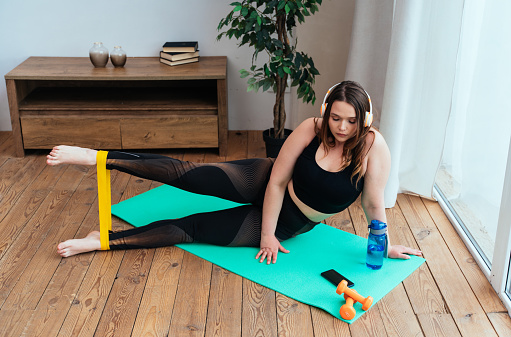We ask the experts to explain the difference between strength and resistance training, so you can pick the best one for your goals.
We’re advised by the government to do two resistance training sessions a week if we want to stay healthy. Why? Well, it strengthens and protects muscles against natural decline and it helps to maintain bone density (both of which are key for avoiding falls and other serious accidents).
Given that 67% of UK women give up exercise entirely in the winter, expecting people to manage two resistance sessions a week seems rather unrealistic. But if you can carve out the time, there are serious benefits to reap.
The real question is what the term ‘resistance training’ really means. Is it the same as strength training? Or is it something we should be doing as well as lifting weights?
You may also like
Strength training: how many times a week should you lift weights?
What is the difference between strength and resistance training?
The key difference is that resistance training can be bodyweight, banded or weighted – anything that creates a resistance against gravity.
Strength training is normally low reps, high weight
“Strength training, on the other hand, is more about building strength and utilising time under tension – which means lower reps at a higher weight,” explains PT Caroline Bragg.
Resistance training can use any equipment
“Resistance training could be mean using bodyweight, or a resistance band, free weights or anything where you’re pushing or pulling against something with added resistance.”
So pilates or barre can count as resistance training because many of the moves are about resisting gravity and moving in ways our bodies don’t usually. While both practices can help to build serious strength, they’re not actually types of strength training because they don’t involve weights and tend to focus on muscular endurance over hypertrophy or power.
Resistance and strength training have different goals
“Strength is not the main goal of resistance training,” explains SWTC trainer Emma Obayuvana. “Strength training is where you are lifting heavy at low reps and specifically training to get stronger.”
You may also like
Barre for beginners: why barre is the full-body workout you need to try

What are the benefits of resistance training?
Better bone density
“Resistance training improves your bone density. We lose muscles as we age, but if you are doing resistance training, you’ll be building more muscle in your body so the rate at which your muscle atrophy will slow,” explains Obayuvana.
Useful in everyday life
Resistance training applies to everyday life –it’s functional training. Obayuvana continues: “You’ll see the direct benefits, such as when lifting a box you’ll know how to lift correctly and be strong enough to do it.
“It also has psychological benefits because you’re going to feel a lot more confident about yourself and your abilities, have a better quality of sleep, and be able to recover better.”
It builds muscular endurance
“Doing higher reps with resistance exercises helps to build endurance up,” says Bragg.
You may also like
Do you need to do cardio if you're weight training? Fitness trainers answer the most Googled questions
Which should you focus on: strength or resistance training?
“Well, I would always start with resistance training because that can mean introducing anything, even just body weight,” says Bragg. “Work on this first to get your form right first, such as learning to nail a bodyweight squat with perfect form. Then you add load and you can start to build strength.”
Of course, as with any thing in fitness, it all depends on your specific goals. If you want to be more mobile, resistance training might be better as it often includes mobility. But if you want to get noticeably stronger, then focusing on a strength training programme is probably the best way to go.
You can, however, do both. “You can have a couple of days a week where you’re focusing solely on your strength, and you will be lifting heavy for low reps. Then after a good recovery time you could have a day where you just focus on general resistance training,” says Obayuvana.
Follow @StrongWomenUK on Instagram for the latest workouts, delicious recipes and motivation from your favourite fitness experts.
Source: Read Full Article
